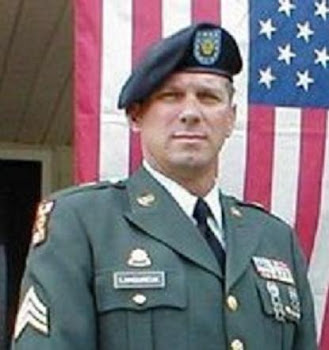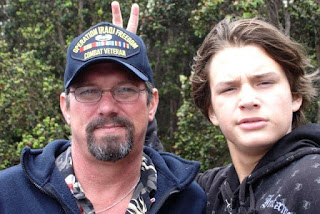Novebmber 25, 2009
The Charleston Gazette
By the Associated Press
"They are linked by tragedy, but also by a shared conviction that the military does an excellent job of keeping troops alive during combat, but not so well at keeping them healthy afterward."
HOLLIDAYSBURG, Pa. -- When the envelope arrived, Windy Horner was talking with her husband, Nick -- Windy on a cell phone, Nick in the Blair County jail.
Windy did not recognize the return address. She feared hate mail; her husband is charged with killing two men and robbing a sandwich shop, and she blames his actions on post-traumatic stress disorder from his service in Iraq, but others do not agree.
"Just because horner went to iraq,'' read one reader comment on a newspaper Web site, "doesnt mean he shouldnt get what he deserves!!!!!!!''
Now, she wondered: Should she open the envelope? Go ahead, Nick said.
The note was from a complete stranger, a woman named Laurie Claar. It was written on a card decorated with a rainbow and flowers, bearing the message, "Caring Thoughts Are With You.''
"I'm not sure what to say to you all except I understand and you all are in my prayers,'' Claar wrote. "And I don't think bad of Nick as he needs help to deal with PTSD.'
(Click here for complete story)
http://www.wvgazette.com/News/200911250917
Sue Lamoureux's blog for her husband, J Patrick Lamoureux. Sue died on 24 August 2015.
PAT LAMOUREUX

PAT LAMOUREUX - One episode in a person's life, does not define the person.
Thursday, November 26, 2009
Sunday, November 22, 2009
Veterans and Law Enforcement: A New Deal Aimed at Preventing Crime?
By Guy Gambill
Guest Contributor
Catalyst Newsletter 2009 Volume 30, Number 10
Some veterans of the War on Terror (primarily the conflicts in Iraq and Afghanistan) are running afoul of the law, but is the deck of cards stacked against them? And are they any different from veterans of other wars? Many believe that psychological problems resulting from their combat experience set a good many of these veterans apart.
The bigger issue is whether law enforcement officers, and even our courts, should deal with these veterans differently from others who come in contact with the judicial system. If they are given a second chance and a shot at mental health counseling, will they avoid a repeat offense?
Perhaps now is the time to recognize the unique issues facing these combat veterans and deal with them in a constructive manner that benefits the service members, their families, and the country they have served so well.
(click here for complete article)
http://www.ncpc.org/programs/catalyst-newsletter/catalyst-newsletter-2009/volume-30-number-10/veterans-and-law-enforcement-a-new-deal-aimed-at-preventing-crime
Guest Contributor
Catalyst Newsletter 2009 Volume 30, Number 10
Some veterans of the War on Terror (primarily the conflicts in Iraq and Afghanistan) are running afoul of the law, but is the deck of cards stacked against them? And are they any different from veterans of other wars? Many believe that psychological problems resulting from their combat experience set a good many of these veterans apart.
The bigger issue is whether law enforcement officers, and even our courts, should deal with these veterans differently from others who come in contact with the judicial system. If they are given a second chance and a shot at mental health counseling, will they avoid a repeat offense?
Perhaps now is the time to recognize the unique issues facing these combat veterans and deal with them in a constructive manner that benefits the service members, their families, and the country they have served so well.
(click here for complete article)
http://www.ncpc.org/programs/catalyst-newsletter/catalyst-newsletter-2009/volume-30-number-10/veterans-and-law-enforcement-a-new-deal-aimed-at-preventing-crime
Subscribe to:
Comments (Atom)
"Grandpa Pat & Kain"

"Kain-man" the jokester....
Pat Lamoureux - Iraq 2003

"Pat is an extraordinary, thoughtful, kind and generous man...not to mention a wonderful friend, in which one could always count upon to be there when in need." (words of a long time friend)
Pat's Family

Mica & Heather, grandson Kain